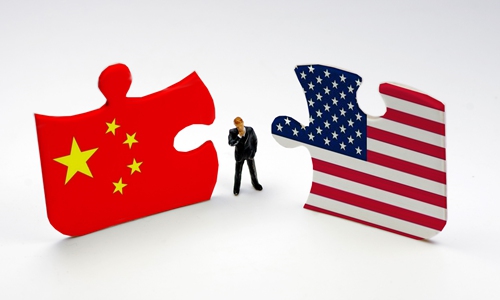HOME >> CHINA
US authorizes espionage activities against Chinese media on its soil with new designation: expert
By Yang Sheng Source:Global Times Published: 2020/2/19 14:53:22
WSJ reporters’ press credentials revocation not retaliation: observer

Photo: VCG
While the US criticizes China for "suppressing freedom of speech," Washington is actually authorizing espionage activities against Chinese media on US soil, said Chinese experts, after the US State Department announced it would designate five Chinese media outlets as foreign missions.
While protesting against the US latest move, the Chinese Foreign Ministry said on Wednesday that China reserves the right to respond further to this matter.
Chinese Foreign Ministry spokesperson Geng Shuang made remarks at a routine press conference, and he said that China expresses strong dissatisfaction and resolute opposition to the US decision and therefore "reserves the right to respond further to this matter."
While the US has always glorified itself on its press freedom, it interrupts Chinese media outlets' normal operations in the US, which is unreasonable and unacceptable, so "we urge the US to take off ideologically colored glasses and abandon the zero-sum Cold War mentality," Geng said.
The Trump administration said on Tuesday that it will begin treating five major Chinese state-run media entities - the Xinhua News Agency, China Global Television Network (CGTN), China Radio International, China Daily Distribution Corp and Hai Tian Development USA, Inc - with US operations the same as foreign embassies, requiring them to register their employees and US properties with the US State Department, Reuters reported.
Shen Yi, head of Fudan University's Cyberspace Governance Research Institute, told the Global Times on Wednesday that although the US move actually identifies Chinese media outlets and their employees in the US as "proxies or agents of foreign governments," which means US intelligence agencies are authorized to conduct spying activities against them.
"Not only will this affect the activities of Chinese journalists in the US, but also US citizens legally employed by these Chinese media outlets, and the US interviewees who communicate with Chinese media could also be targeted by the FBI and CIA," Shen said.
"Tensions between the two superpowers have escalated since President Donald Trump came to office three years ago, with disputes ranging from trade tariffs to accusations of Chinese spying in the US and to US support for Taiwan," Reuters reported.
It is not hard to imagine who came up with this idea, Shen said, adding: "Mike Pompeo, the head of the US State Department, who was once director of the CIA, is a man whose brain is filled with a Cold War mentality."
When the US lectures or accuses China on the issue of "freedom of speech," Washington is doing nasty and terrible things to contain Chinese media outlets that express their voice in the US, and this is truly ironic and hypocritical, said Chinese experts.
The five entities' US operations will have to disclose their personnel rosters and hiring and firing decisions, and register properties in the US that they rent or own with the State Department, the officials with the US State Department were quoted as saying.
They will also have to seek advance approval before they lease or purchase new US properties, Reuters reported citing these officials.
An anonymous US official interviewed by CNN also pointed to the 2017 National Security Strategy, which identified great power competition as a central focus and China as one of the US' main competitors, along with Russia.
No official could explain why Russian state-owned media outlets operating in the US were not being designated as well, CNN reported. Chinese experts noted that this could also be seen as a trick to drive a wedge between China and Russia.
In 2017, Russian media outlet RT America was forced by the US Justice Department to register as "foreign agent" according to the US Foreign Agent Regulation Act, and China's Xinhua and CGTN were also required to do so in 2019.
But the new policy against Chinese media outlets shows an escalation that specifically targets China and further strains the China-US relationship, said Diao Daming, an associate professor and US studies expert at the Renmin University of China.
"The Foreign Agent Regulation Act just targets proxies and lobby groups, but not foreign embassies and missions, so the latest decision is an escalation of containment against China. This is an act that politicizes normal journalistic activities, and it shows that the whole US government is applying a competitive strategy toward China," Diao noted.
The Chinese Foreign Ministry also announced its decision to revoke the press credentials of three Beijing-based journalists from the Wall Street Journal (WSJ) on Wednesday after the newspaper published an article with a "racist headline," which called China the "sick man of Asia," and refused to correct its attitude and tender a formal apology over the issue.
China will continue supporting and providing conveniences to foreign media outlets that respect China's law and people based on international conventions, Geng said.
China deals with foreign journalists' affairs in accordance with the laws. Chinese people do not welcome media that shoot racist comments, or smear China on purpose, Geng noted.
This is specifically punishing the Wall Street Journal for its poor attitude and unwelcome behavior that seriously offended the Chinese people, rather than a retaliation to the US' new policy to designate five Chinese media outlets as foreign missions, said Diao.
China doesn't need to equally retaliate against every single US media outlet in China, but can use legal measures to strictly punish those US media outlets or journalists who conduct anti-China propaganda, publishing racist opinions against Chinese people and concoct fake and biased news to smear China, Diao added.
Newspaper headline: China opposes US actions against media
Posted in: POLITICS